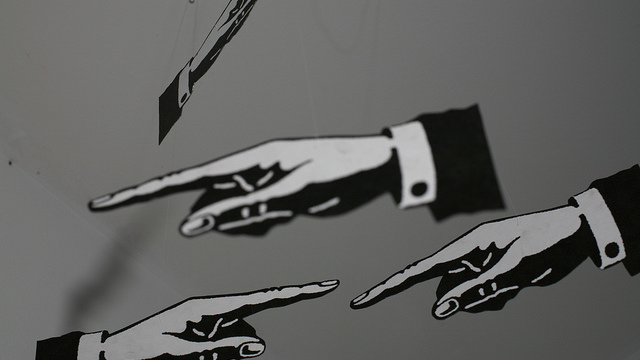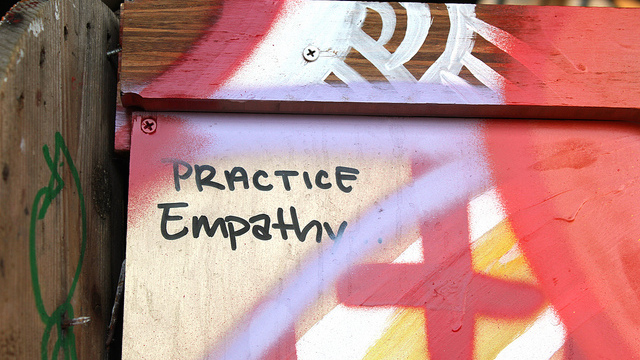Being full of yourself has its benefits, but when your Instagram feed is nothing but shirtless selfies, you’ve probably taken it too far. If you (or someone you know) displays more solipsistic qualities than empathetic ones, there’s still hope. Here’s how to get over yourself so you can build relationships that actually matter.
Photos by angrylambie1, Peter, J E Theriot, Quinn Dombrowski
Does This Sound Like You?

There’s a thin line between confidence and self-absorption. Taken too far, that ego gets inflated and selfishness ends up ruining relationships with other people and yourself. A narcissist quickly succumbs to the “it’s all about me” idea. Do you suck at taking criticism? Do you take charge of every conversation? Do you blame others without regard for what you’ve done wrong? Then you probably have some narcissistic traits.
When everything’s about you, it’s almost impossible to take criticism, have meaningful conversations, or practise any kind of self-reflection. In short, it’s easy to become a narcissistic idiot without even realising it.
There’s certainly an extreme here that comes with the bona-fide mental illness, narcissistic personality disorder, that requires much more help than a blog post can provide. But for those of us who only display a few of these self-absorbed traits, there’s hope. As is usually the case with these types of things, it’s about recognising those traits in yourself — which is hard — then scrutinising them. If you’re not sure if you have narcissistic traits or not, this quiz over on Psych Central can help you figure it out (for what it’s worth, I scored a 19, which is right in between celebrities and full-blown narcissists, apparently).
You Always Blame Other People And Never Yourself

If your main concern is yourself, you won’t take criticism very well. You’ll get offended easily in both the workplace and your relationships. You take every criticism personally and try to shove it away, thinking you can do no wrong (but somehow everyone else does). You’ll blame other people instead of yourself, which makes taking criticism even harder. This causes all kinds of obvious issues, but 99u breaks down one problem you might not think about it:
When you put your self-perception ahead of the work, you are in danger of compromising your best efforts. Collaboration also becomes more challenging, because others grow tired of walking on eggshells. You must nix the tendency to be easily offended, and instead embrace the opportunity that disagreements or disconfirming information provide to sharpen your thoughts and skills.
In short, if you can’t take criticism, you’re a pain to work with. If you have a hard time admitting when you’re wrong, nobody wants to work with you or challenge you. When you’re not being challenged, you aren’t going to get better or produce anything new. It’s a cycle that quickly causes personal growth to come to a standstill. We’ve talked a lot about taking criticism in the past, but when you’re self-involved, you tend ignore that feedback and attack the person criticising you. It’s really hard for everyone to read criticism, but after you hear it for the first time, do a second pass and try to pull out the stuff you can do to improve. Separate anything out that you’re taking personally, and you might be surprised at how much you actually agree with.
You Talk About Yourself More Than You Ask Questions

We all know that asking questions is one of the best ways to get through small talk, but a narcissist would much rather talk about their own accomplishments. If you’ve ever been in a conversation with someone who only talks about themselves, you know exactly how obnoxious this is.
So force yourself to ask more questions during conversations. It doesn’t matter what they’re about, but pull the focus off yourself. It’s also important how you ask those questions. The Art of Manliness describes the differences between what they call shift-response and support-response:
The support-response keeps attention on the speaker and on the topic he or she has introduced. The shift-response attempts to set the stage for the other person to change the topic and shift the attention to themselves. Let’s look at an example of the difference between the two:
Support-Response
James: I’m thinking about buying a new car.
Rob: Oh yeah? What models have you looked at?Shift-Response
James: I’m thinking about buying a new car.
Rob: Oh yeah? I’m thinking about buying a new car too.
James: Really?
Rob: Yup, I just test drove a Mustang yesterday and it was awesome.
In the support-response, you keep the attention on them. In the shift-response, you bring it back to you. It’s a subtle thing you might not notice yourself doing, but if you keep an eye on it and formulate your questions accordingly. It’s easy enough to stop. Likewise, pay attention to your background acknowledgements — those yeahs, uh-huhs and sures — and make sure you’re getting them in at just the right pauses in conversation. If not, it seems like you’re not really listening, which makes it hard to continue the conversation.
From there, it’s about listening and not dominating the conversation. Consider it a challenge. If you can go five minutes in a conversation without talking about yourself, your own experiences, or relating some other random tidbits about yourself, you win. That doesn’t mean you shouldn’t talk about yourself, but hopefully you can temper that boasting enough that you’re not annoying everyone around you.
You Lack Empathy

When you’re narcissistic, you lack empathy. You only think about what you need, how you can get what you want, and how you things make you feel. Without that ability to understand others, you’re going to struggle in most social relationships. As we noted at the start of this post, there aren’t a lot of magic bullets for getting over yourself. It takes work and chances are, no matter how hard you try, you’ll always think about yourself first. Psychology Today suggests you refuse to act out those superior traits:
Narcissism can be a tricky thing to treat, but the first step is being willing to notice and even acknowledge when a person has the traits. People can’t always control how they think, but they can control how they treat themselves and others. By acting kindly toward others and refusing to act out superior attitudes or tendencies to demean them, people can take a stand against these offensive traits in themselves. They can also treat themselves more compassionately when they fail to live up to idealised standards of perfection and righteousness.
You first reaction might be a static trait, but you can change when you react. As we’ve pointed out before, empathy is something you can learn. It’s all about paying more attention to the world, considering other points of view, and stifling that default, self-centred reaction. Over time, that initial reaction quiets down and is easier to ignore. Over on Signal v. Noise, Jason Fried talks about taking five minutes to let an idea sink in before responding. This curbs the knee-jerk narcissistic reaction and gives you a little more time to sit with a new idea. Take that time to really think about it and try to see where the other person is coming from. It takes work, but the more you see the world from other points of view, the lower your own pedestal gets.

Comments
One response to “How To Realise You’re Being A Narcissistic Idiot, And Stop”
I scored a 2….
Actually some of the questions in that PsychCentral test seem to suggest narcissism purely through a person picking the less narcissistic answer (e.g. the question on modesty)…